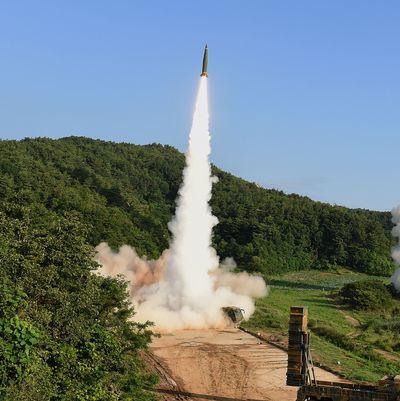
A few weeks before taking office, President Trump assured Americans via Twitter that they didn’t need to worry about North Korea developing a nuclear weapon capable of hitting the United States on his watch:
It’s not clear exactly what Trump meant, but over Fourth of July weekend, North Korea demonstrated that it’s taken a significant step toward being able to fire a nuclear weapon at the U.S.
On Tuesday in North Korea (late on Monday in the United States), Kim Jong-un’s regime tested its first intercontinental-ballistic missile. North Korea’s Academy of Defense Science claimed the Hwasong-14 was the “final step” in creating a “confident and powerful nuclear state that can strike anywhere on Earth.” As usual, North Korea is seriously exaggerating its military capabilities, but the U.S. State Department and the Pentagon confirmed on Tuesday that the missile was an ICBM. The Hwasong-14 was in the air for 37 minutes, and South Korean and Japanese officials said it flew for more than 500 miles before landing in the ocean off Japan’s coast. The missile was fired at a steep trajectory, but experts said it may show Pyongyang is capable of reaching Alaska.
It seems unlikely that North Korea would launch a preemptive strike against the U.S., and experts believe they’re still a few years away from figuring out how to put a nuclear warhead on an ICBM. But needless to say, the latest launch puts the U.S. in a very delicate and dangerous situation. President Trump responded late on Monday night by mocking Kim on Twitter.
Once again, it’s unclear what that means for U.S. policy, and the tweet drew criticism from both Republican and Democratic lawmakers.
“Instead of vague Twitter bluster, President Trump should answer North Korea’s dangerous test with a coherent strategy of direct diplomacy with Pyongyang and increased economic sanctions pressure from China,” said Democratic senator Edward Markey, who sits on the Senate Foreign Relations Committee. “Each additional test will bring North Korea closer to the capability of delivering a nuclear weapon to American cities.”
“We must bring greater pressure to bear on North Korea, and its international patrons, China and Russia,” said Republican senator Deb Fischer, who is on the Senate Armed Services Committee. “But we should have no illusions that they will solve this problem for us.”
The Trump administration did not provide much clarification. The president spent most of the weekend at his golf club in Bedminster, New Jersey, and he did not mention North Korea in his brief remarks at the a military picnic on the South Lawn at the White House on Tuesday afternoon.
Meanwhile, Secretary of State Rex Tillerson released a statement that described North Korea’s ICBM launch as a “new escalation” of their threat to the world. He said that during an emergency session of the United Nations Security Council on Wednesday, the U.S. will call for “stronger measures” against North Korea. The statement alluded to putting greater pressure on China, but didn’t mention the country by name:
Global action is required to stop a global threat. Any country that hosts North Korean guest workers, provides any economic or military benefits, or fails to fully implement UN Security Council resolutions is aiding and abetting a dangerous regime. All nations should publicly demonstrate to North Korea that there are consequences to their pursuit of nuclear weapons.
The U.S. and South Korean militaries also conducted their own show of force on Tuesday, firing “deep strike” precision missiles into South Korean waters on Wednesday. “The launch continues to demonstrate that North Korea poses a threat to the United States and our allies,” said Dana White, a Pentagon spokesperson. “Together with the Republic of Korea, we conducted a combined exercise to show our precision fire capability.”
North Korean state media followed up on Wednesday with a report about Kim “feasting his eyes” on the ICBM. It said Kim urged his scientists to “frequently send big and small ‘gift packages’ to the Yankees,” apparently referring to continued missile tests.
Trump has several options, but as the New York Times reports, they’re all risky. He can step up sanctions and increase the U.S. military presence off the Korean Peninsula, but he’s already tried that, and apparently it didn’t deter Kim. Trump was already set to meet with world leaders later this week at the G-20, and he’s expected to pressure them to back stricter U.N. sanctions on North Korea — and to urge President Xi Jinping to do more to rein in China’s neighbor. China’s “heavy move” might include cutting exports of essential goods like oil to North Korea, reducing imports, and barring Chinese tourists from entering the country. But China has already disappointed several U.S. presidents when it comes to North Korea, and there are internal disagreements about whether a nuclear-armed Pyongyang or a unified Korea is a bigger problem for Beijing.
Then there are the two most extreme options: on one end, launching a preemptive strike if North Korea tries another missile test, and on the other, attempting to negotiate with Pyongyang. Euan Graham, director of the International Security Program at Sydney’s Lowy Institute, tells CNN that while new South Korean president Moon Jae-in is in favor of diplomatic engagement, other nations will likely find that unacceptable “for the time being.” A military strike is “untenable,” as it could instigate a retaliatory action from Pyongyang that would kill millions in Seoul.
“The inevitable end point will be that we do live with a nuclear North Korea with long-range missiles in some form and it is only a matter of time until that bitter pill is swallowed in Washington,” he said. “(Either way) we’ve got no doubt a rocky road for the remainder of this year.”






























